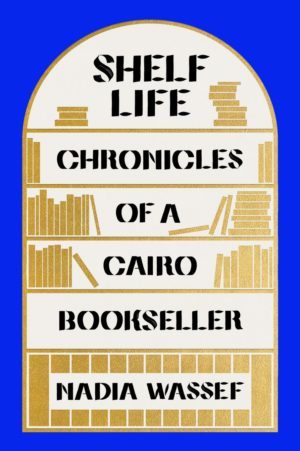Shelf Life
by Nadia Wassef
reviewed by Virginia Marshall
“Diwan was my love letter to Egypt,” Nadia Wassef writes in the opening of her memoir, Shelf Life: Chronicles of a Cairo Bookseller. “And this book is my love letter to Diwan.” At its most basic level, Diwan is a bookstore in Cairo that the author, along with her sister Hind and best friend Nihal, opened in 2002. But Wassef’s book soon shows that Diwan is so much more than a bookstore. Since its founding, Diwan has become a symbol of intellectual freedom in the Middle East, a feminist statement in a business world still dominated by men, a refuge for modern Egyptians, a meeting place, a café, and an all-consuming enterprise that gave its name to all three of its cofounders (each woman, after working all hours and pouring their hearts and minds into the store, became known affectionately as “Mrs. Diwan”). Diwan is, in the end, a place more than worthy of a book-length love letter.
Wassef’s narrative is fluid but not flashy, striking the right balance between surprising and efficient. She’s divided the chapters into sections of the bookstore, beginning with the café and progressing through “Egypt Essentials,” “Cookery,” “Business and Management,” and even “Pregnancy and Parenting” and “Self-Help.” Through anecdotes about the books, their booksellers, and the people who purchase them, we get to know the history and character of Cairo. We track the journey a book makes from being ordered to being placed on a shelf, a process that can take weeks or months “depending on the tangle of regulations, missing paperwork, capacity, and staff.” “When these books finally reached their destination,” Wassef admits, “I treated them with the kindness granted to weary travelers.” And even after they’re safely shelved, their fate can be uncertain. Wassef recounts a time she was summoned to a government censor’s office (books, along with other media, are monitored in Egypt). While waiting to speak to the censor, she runs through a catalog of Diwan titles that could’ve triggered the summons: Lolita? Lady Chatterley’s Lover? In the end, it was a cookbook by Jamie Oliver titled The Naked Chef that raised alarms. Wassef leaves the office laughing.
The three Mrs. Diwans settle into their domains fairly quickly. Wassef herself assumes the role of head buyer of foreign books, her sister the head buyer of Arabic titles. A friendly rivalry ensues. The French and English books bring in more money, but Diwan sells more Arabic titles overall, and it’s the Arabic-language stock that makes the store authentically local. The rivalry between the sisters not only illustrates their intimate relationship, but also serves as an insight into modern Egypt. “The story of Cairo is, primarily, a tale of two cities: one takes place in Egyptian pounds, the other, in foreign currency,” Wassef explains. “People who live on the Egyptian pound go to government schools, take public transport, and try to stay above the poverty line. [ … ] Books are not a necessity, but a luxury.” The other city is the “sheltered, U.S.-dollar-dominated Cairo,” made up of people who attend private schools, employ their own drivers and cooks, and read books in French or English rather than Arabic. In Cairo, the books one buys and the money one uses to pay for them can indicate everything about one’s upbringing, social class, and values.
Not every story in Shelf Life is about books. In one chapter, Wassef writes about her insistence that Diwan have a clean and well-stocked bathroom, and why this mattered:
It was this reality that brought to Diwan an entire cross-section of women who were not necessarily readers, but who found relief at the end of its winding corridors [ … ] Few shops had facilities, and if they did, the proprietors were not inclined to share them. Diwan was more gracious. And the café, with its book-covered walls, became a makeshift barrier between women and their harassers, men who knew that we, the women of Diwan, wouldn’t tolerate their hostility.
Through the maze of the bookstore, and on the streets outside it, we encounter the community that supported the writer and her business. Wassef’s driver, her cook and house cleaner, her mother, father, and daughters are all supporting characters in the unfolding play about Cairo and its reading habits. We learn, too, about Wassef herself, about the confidence it took to open a small, independent book store in what was—and still is—an unstable economy. Wassef is whip-smart, the loudest of the three Mrs. Diwans, with an occasionally foul mouth and a persistent sense of justice when dealing with her staff. She is honest about her own story, too. She writes of her two divorces and her struggle to raise two girls as a single parent (“I’m a guilty working mother,” she confesses to a bubbly journalist during an interview for a women’s magazine. “But I made my choices. I want my girls to grow up in a home where their mother works.”) Eventually, Wassef decides to step back from running Diwan to focus on her family and her writing. Almost twenty years later, the shop is still going strong, with Nihal and others still at the helm. But no reader of this book would say that Wassef gave up on the store. She gave it her all, and said goodbye in order to add another wonderful book to its inventory. Shelf Life is a moving portrait of Diwan and the Cairo that embraced it, an ode to all the people who have kept it going.
Published on October 19, 2021

